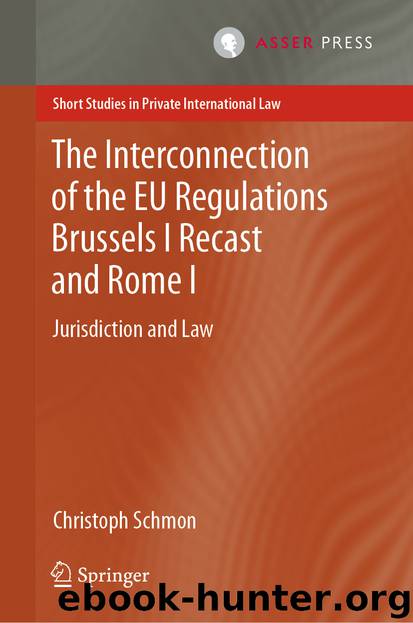The Interconnection of the EU Regulations Brussels I Recast and Rome I by Christoph Schmon

Author:Christoph Schmon
Language: eng
Format: epub
ISBN: 9789462653672
Publisher: T.M.C. Asser Press
5.8.2 The Price of EU Integration
The Europeanisation process comes at a price. Mutual trust means blindly accepting and enforcing a foreign judgment at the will of the creditor. Without corrective options for domestic courts, procedural fairness and access to justice are under attack. The exequatur—the proceeding for the declaration of enforceability—forms such a corrective option. It was removed by the Brussels I Recast Regulation, which kept only the public policy exception.
The Rome I Regulation shows some remarkable properties as well. Although it determines the law applicable ad intra and ad extra and avoids the existence of two different sets of conflict rules,31 its internal-market clause (Article 3(4)) gives effect to the mandatory rules of EU law in cases where all other elements relevant to the situation at the time of the choice of law are located in one or more Member States. Of course, even the conflict of laws rules of Savignian character allow for exceptions to the strict parity of laws in the form of rules protecting imperative state interests (‘positive mandatory rules’ of the lex fori32). However, the internal-market clause is a doctrine that ignores the parity of laws entirely as it gives effect to all the mandatory Union rules in domestic cases, and not merely to provisions, respect for which is regarded crucial by a country for safeguarding its public interests.33 A certain discriminatory focus on intra-EU situations can also be seen in the example of overriding mandatory provisions under Article 9, which protects crucial matters of public interest of the forum country. The respect for provisions that are crucial for safeguarding the public interest also covers Union rules, for they are part of the Member States order. The rule of Union law can also be observed at the level of interpretation. Article 9(3) states that certain overriding mandatory provisions of the law of the country where the obligations arising out of the contract have to be or have been performed may be given effect. It is considered that the principle of loyal cooperation requires that effect must be given where this would otherwise result in unnecessary harm for the Member State concerned.34 Another corrective option is formed by the ordre public, demonstrating that there is no value-blind formalism in conflicts of laws.35
Download
This site does not store any files on its server. We only index and link to content provided by other sites. Please contact the content providers to delete copyright contents if any and email us, we'll remove relevant links or contents immediately.
The Pirates of Somalia by Jay Bahadur(1627)
Political Theology by Carl Schmitt(1577)
The Holocaust: A New History by Laurence Rees(1521)
The Social Animal by David Brooks(1452)
A Practical Guide to International Arbitration in London by Hilary Heilbron(1434)
Restitution by Restitution(1424)
Pirates of Somalia by Jay Bahadur(1382)
Coercing Virtue by Robert H. Bork(1357)
The Nuremberg Interviews by Leon Goldensohn(1304)
Basic International Corporate Taxation by Sebastiano Garufi(1214)
A History Of Thailand by Baker Chris(1190)
International Trade and Business: Law, Policy and Ethics by Gabriël Moens & Peter Gillies(1149)
The Global Commons by Susan J. Buck(1137)
The Sovereignty of Human Rights by Macklem Patrick(1113)
Blood Profits by Vanessa Neumann(1113)
Asian Waters by Humphrey Hawksley(1113)
Spring Fever: The Illusion of Islamic Democracy by McCarthy Andrew C(1103)
The Nuremberg Trials: The Nazis and their Crimes Against Humanity by Roland Paul(1053)
Crimes Against Humanity: Historical Evolution and Contemporary Application by M. Cherif Bassiouni(1028)
